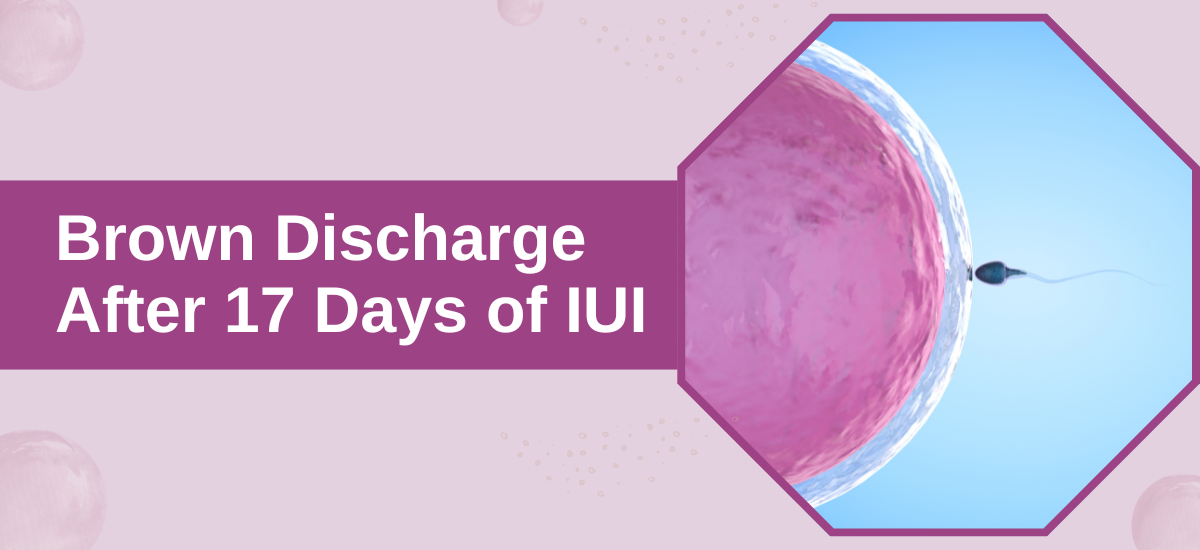- Have any questions?
- +91-98717 17305
- babiesandus12@gmail.com
Brown Discharge After 17 Days of IUI

Stomach Pain After 15 Days of IUI
June 12, 2024
IVF After Miscarriage
July 16, 2024Experiencing brown discharge after 17 days of IUI can be concerning for many women. This unexpected symptom often raises questions about the success of the procedure and the health of the potential pregnancy. Understanding the causes and implications of brown discharge is crucial for peace of mind and taking appropriate action.
At Babies & Us IVF centre in Mumbai, we specialize in addressing concerns related to fertility treatments. Our team of experienced professionals is dedicated to providing comprehensive care and support throughout your fertility journey. With state-of-the-art facilities and a compassionate approach, we ensure that each patient receives the best possible care.
Overview: Brown Discharge After IUI
Brown discharge after IUI can be worrisome, particularly if you’re unsure of its cause. It can start as soon as a few days after IUI or as late as two weeks or more. Typically, this discharge can last a few days to a week. However, the duration varies based on individual circumstances. If you experience prolonged or heavy bleeding, it’s essential to discuss it with your healthcare provider promptly.
Is Brown Discharge After 17 Days of IUI Normal? How Common Is It?

Brown discharge after IUI is relatively common and usually not a cause for concern. However, the occurrence of brown discharge varies widely among women. For some, it may indicate implantation bleeding, which occurs when the fertilized egg attaches to the uterine lining. For others, it might be the result of hormonal changes or the beginning of a menstrual period if the IUI was unsuccessful.
However, it is essential to distinguish between normal brown discharge and symptoms that may indicate complications. If the discharge is accompanied by severe cramping, heavy bleeding, or a foul odour, it is crucial to consult a medical expert immediately.
Concerned about your symptoms? Consult a fertility specialist now for expert advice and care.
Do you know what might be causing your symptoms? Let’s break it down.
Causes of Brown Discharge After 17 Days of IUI
Understanding the causes of brown discharge can help alleviate concerns. Here are some common reasons:
●Implantation Bleeding:
It occurs when the fertilized egg attaches to the uterine lining, causing light bleeding or brown discharge.
●Hormonal Changes:
Fluctuations in hormones after IUI can lead to spotting or brown discharge.
●Cervical Irritation:
The cervix can become sensitive after the procedure, leading to minor bleeding.
●Old Blood:
Blood that wasn’t expelled during your last period can sometimes be released later, appearing as a brown discharge.
But how do we address these symptoms? Let’s discuss next steps.
What Should Be Done?

If you experience brown discharge after 17 days of IUI, the first step is not to panic. Monitoring your symptoms closely is crucial. Keep track of the duration, volume, and any accompanying symptoms. This information can be vital for your doctor to determine the cause and take the necessary steps.
If the discharge is light and short-lived, it may not require any specific treatment. However, if you notice heavy bleeding, severe pain, or a foul smell, seeking immediate medical attention is advised. Regular follow-ups are essential to address issues promptly and effectively.
Staying in touch with your fertility specialist is essential. They can conduct necessary tests or ultrasounds to determine the cause of the discharge. At Babies & Us IVF Centre, our team is equipped to handle such concerns with care and expertise, ensuring you receive the necessary support and guidance.
Want to discuss your symptoms further? Schedule an appointment with a seasoned professional today for expert guidance.
What other signs should you watch for after IUI? Here’s what you need to know.
Other Signs After 17 Days of IUI

Other symptoms might indicate your pregnancy status or overall reproductive health besides brown discharge. Here are some signs to watch out for:
●Cramping: Mild cramping can be normal, but severe pain should be checked.
●Spotting: Light spotting can occur due to various reasons, including hormonal changes.
●Breast Tenderness: This is a common early pregnancy symptom.
●Nausea: Often an early sign of pregnancy.
Conclusion
Brown discharge after 17 days of IUI can be a common and normal occurrence. Understanding the potential causes and knowing when to seek medical advice is crucial for ensuring peace of mind and health. At Babies & Us IVF Centre in Mumbai, a team of seasoned fertility doctors provides expert care and guidance to help you navigate these symptoms and other concerns.
Your journey to parenthood deserves the best care and support. Book a consultation with an expert for personalized advice and treatment.
Frequently Asked Questions:
How long should brown discharge last after IUI?
Brown discharge typically lasts a few days but can extend to a week. If it persists longer, consult a healthcare professional.
Can brown discharge indicate a failed IUI?
Brown discharge alone does not indicate a failed IUI. Following up with your doctor for appropriate tests and evaluations is essential.
Is it common to have brown discharge without being pregnant after IUI?
Yes, hormonal changes or cervical irritation can cause brown discharge even if you are not pregnant.
Is brown discharge after IUI a sign of miscarriage?
Not necessarily. While brown discharge can be a sign of complications, it is often harmless. Always consult your doctor for an accurate diagnosis.
How can I differentiate between implantation bleeding and other types of discharge?
Implantation bleeding is usually light and short-lived. Other types of discharge may be heavier and last longer. Consult your doctor for precise differentiation.
Can brown discharge be a sign of an infection?
Yes, brown discharge with a foul smell or accompanied by pain could indicate an infection. Seek medical attention if you suspect an infection.
Does the color of the discharge matter?
Brown discharge typically indicates old blood. In contrast, bright red blood could signal active bleeding and may require medical attention.
Reference links:
https://my.clevelandclinic.org/health/treatments/22456-iui-intrauterine-insemination




